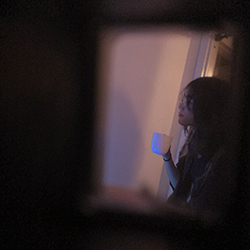cultivar
![] type ] deliriant effect
] known only in cultivation1 as
] escapees2
] popular ornament
] exist wild outside their native range3 as introduced suspected
] some animal
] cult ensured continued survival [
4
] alternately arranged
] across, an entire coarse
] margin, of name5
] -shaped6
] opening.
] strong, pleasing7 noticeable
] shades of
] old,
] shredded forms8 Some
] only
] long to
] own orname9 contain
] naturalize in isolate10
] dispersal accomplished
] their fruits now
shrivel on the plants without progeny.
11 They have been maintained in cultivation as a source of [
] by humans.](https://beestungmag.com/wp-content/uploads/nguyen-2-poems-whale-fall-cultivar-2-967x1024.png)
¹ the same structure, project
& projected. every fault
needed a name, a treat[ise],
in/corporation. we learned
what makes the body a lie
& not a body, recognized
their gaze staring out of us,
& it was the first time we
realized we [were] wanted.
² we built a new language
from dial-tones, we held
each other to our ears
& laughed & laughed
& answered, our voices
mistaken for silence by
everybody except us.
³ our bodies were born[e] in[to]
exile, our mothers’ daughters.
4 weathering their ord[i]nances, we
ached for lexicons free[d] of hurt,
we carved bombshells into calling-
bells, prayer-flags, wind-chimes
that caught the breeze & brought it
to us as sutras, we listened, we
built, we failed & failed & failed.
5 we knew we were kept things,
learned how to pick our names
like locks, held them as secrets
meant to be shouted, treasured
salvage, strange & idiosyncratic.
6 like every girl, we were sculpted
hollow as any god. we followed
hunger, daisy-chained into the sun
-showers & pressed ourselves into
each other’s hands, each lingering
touch leaving fingerprints we took
as permission we could never give
ourselves to be changed, to become
defaced monuments to our fathers.
7 the moment we entered their
fantasies, we knew what they
wanted, we gathered fabric,
fashioned ourselves silhouettes
from their narratives to survive.
always we were craved, spent,
discarded. we saw it then, mirror
-close, their curiosity, soured.
8 we made camp in the diegetic
ruins, listened to the brick’s
murmurs rasp against our
fingertips, tore every last syn-
tactic structure into ribbons.
we knit them into blankets,
warded off the clinic’s lingering
shadow. in the morning we
were awake, unnamed, still
allowed to be anything.
9 they too had poets, they twisted
our forms into synecdoche, pulp,
the first jokes to be cut into teeth;
our first names were from their
dialect[ics], our mother tongues.
10 some of us longed to be human,
combed through manuals in hopes
of becoming legible, let them write
us into case studies & declare it
medicine, claiming we could only
ever be stitched things, dolled up
for men who picked up scalpels
and called themselves surgeons.
11 we severed the old logic, its unbroken
lines, continued traditions without our
mothers. they found the ruined terraces
of our births and named us barren, not
knowing we grew homes that weren’t
farmlands, that we could raise daughters
without asking them to wear our names.

iris nguyễn (they/she/chị/em) is a transfem poet living in New Brunswick. She found a loose thread on her body and hasn’t stopped pulling since. They can be found at ih-cn.carrd.co or @acensusofstars on Twitter.

